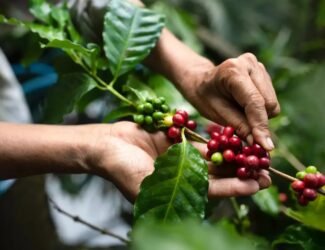
Global Coffee Industry Advances Sustainability with Circular Economy Initiatives
In a significant step towards sustainability and economic resilience, the global coffee industry is increasingly adopting the principles of a circular economy. A newly released document titled “Making a Case for a Circular Economy in the Coffee Sector” provides comprehensive insights from a multi-stakeholder working group on how this transformative approach can reshape the coffee sector. The report emphasizes the urgent need to address the challenges of waste generation and environmental impact through circular economy practices.
The International Trade Centre (ITC), in collaboration with other key organizations such as the International Coffee Organization (ICO), Global Coffee Platform, Technoserve, World Coffee Research, IDH Sustainable Trade Initiative, Enveritas, and the Rainforest Alliance, has been instrumental in driving this initiative. These organizations have come together to launch the Coffee Guide Network to promote sustainable and ethical practices within the coffee industry. This global community of coffee experts aims to bridge information gaps, foster collaboration, and provide practical resources for coffee professionals, policymakers, academics, and consumers. Available in multiple languages, the Coffee Guide Network serves as a central reference for coffee knowledge, encouraging responsible trade, production, and consumption systems.
Key Insights from the Report
The circular economy model being adopted by the coffee industry focuses on adding value to resources, reducing waste, and keeping materials in use for as long as possible. The document highlights several key opportunities and challenges in implementing this model.
Opportunities within a Circular Coffee Economy
- Valorization of By-products: Coffee cherries, pulp, husks, and parchment can be transformed into a variety of products such as teas, flours, snack foods, biofoliars, compost, mulch, animal feed, and even building materials. The silverskin, a thin layer around green coffee beans, can be utilized in cosmetics, paper, vegan leather, and food products. Spent coffee grounds, which constitute a significant portion of coffee waste, can be repurposed for mushroom cultivation, biofuels, biochar, and other applications.
- Economic Benefits: By reimagining waste streams and finding new uses for by-products, the industry can create additional environmental value and new economic opportunities for farmers and small to medium-sized enterprises (MSMEs). This approach is expected to lead to job creation, income diversification, and enhanced resilience in coffee-growing communities.
- Sustainability and Environmental Impact: The adoption of a circular economy can significantly reduce the environmental footprint of the coffee industry by minimizing waste and promoting the reuse of materials. This contributes to more sustainable production and consumption patterns, aligning with global environmental goals.
Challenges in Implementing a Circular Economy
Despite the potential benefits, the report identifies several challenges in implementing a circular economy at scale in the coffee sector:
- Policy and Regulatory Adaptations: There is a need for supportive policies and regulatory frameworks that facilitate the transition to a circular economy. This includes regulations that encourage recycling, waste management, and the use of sustainable materials.
- Mobilization of Financial Resources: Securing the necessary funding for circular economy initiatives can be challenging. Innovative financial mechanisms and investment in research and development are crucial to support the transition.
- Market Development and Consumer Awareness: Developing markets for circular products and increasing consumer awareness about the benefits of a circular economy are essential. This requires effective communication strategies and educational campaigns to shift consumer behavior towards sustainable practices.
- Standardized Guidelines and Best Practices: Establishing standardized guidelines and best practices for circular economy initiatives is vital for consistency and scalability. This includes creating benchmarks and metrics to measure progress and impact.
Recommendations for Driving the Transition
To drive the transition towards a circular economy in the coffee sector, the document provides several key recommendations:
- Fostering Regenerative Agriculture: Promoting agricultural practices that restore and enhance ecosystems, improve soil health, and increase biodiversity.
- Supporting Research and Development: Investing in research and development for value-added products and innovations that utilize coffee by-products.
- Establishing Standardized Guidelines: Developing and implementing standardized guidelines for circular economy practices within the coffee industry.
- Developing New Financial Mechanisms: Creating innovative financial mechanisms to support circular economy initiatives and attract investment.
- Promoting Consumer Awareness: Educating consumers about the benefits of a circular economy and encouraging sustainable consumption patterns.
- Building Global Knowledge Networks: Strengthening global networks to share knowledge, resources, and best practices among stakeholders in the coffee industry.
Collaborative Efforts for a Sustainable Future
The launch of the Coffee Guide Network and the Circular Economy Working Group marks a significant milestone towards a more sustainable and ethical coffee industry. By bringing together experts and stakeholders from various backgrounds, the initiative fosters collaboration and collective action to address the pressing challenges faced by the coffee sector. The resources and knowledge provided by the Coffee Guide Network will empower coffee professionals, policymakers, and consumers to make informed decisions and contribute to a more sustainable and responsible coffee industry.
As global demand for coffee continues to rise, ensuring the industry operates sustainably and ethically is imperative. The Coffee Guide Network’s launch is a significant step in promoting responsible trade, production, and consumption systems in the coffee sector. Through partnerships and collaboration, this initiative aims to create a more resilient and inclusive coffee industry, benefiting farmers, MSMEs, and consumers alike.
The collective efforts of the ITC, ICO, Global Coffee Platform, Technoserve, World Coffee Research, IDH Sustainable Trade Initiative, Enveritas, and the Rainforest Alliance underscore a unified commitment to transforming the coffee sector. By implementing the recommendations outlined in the report, the coffee industry can move towards a circular economy that fosters sustainability, economic growth, and ethical practices across the entire value chain.



